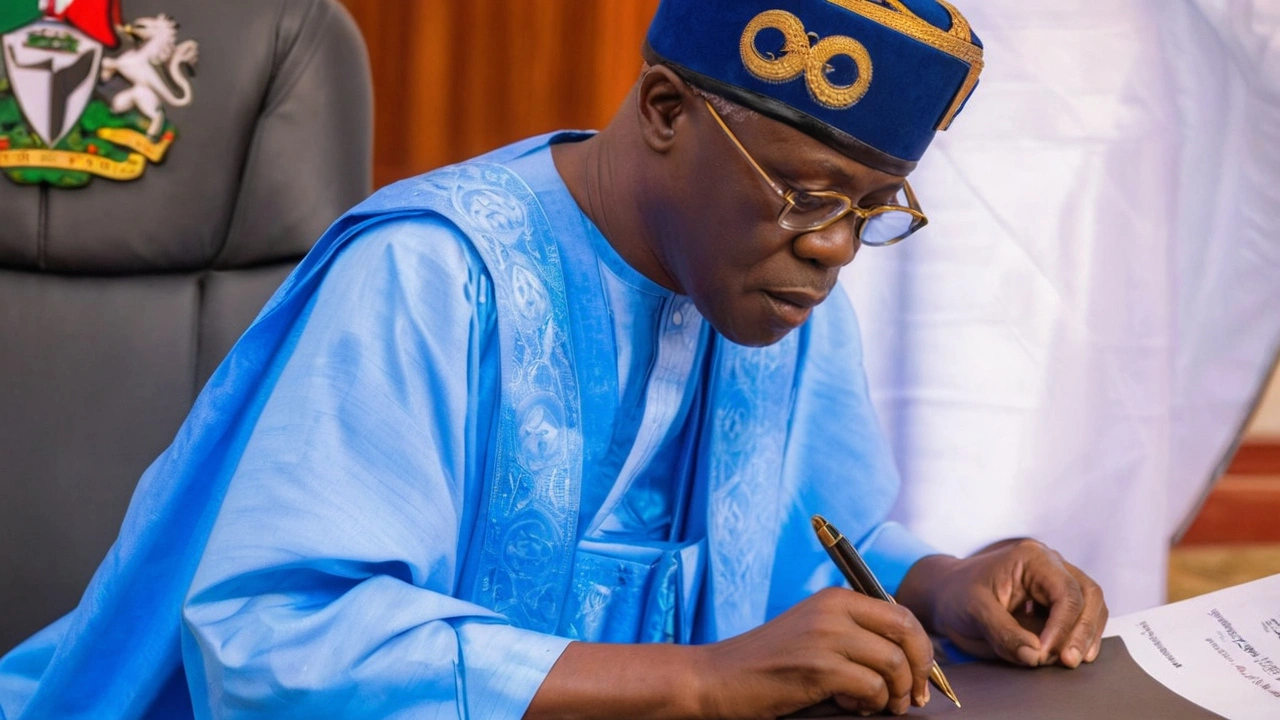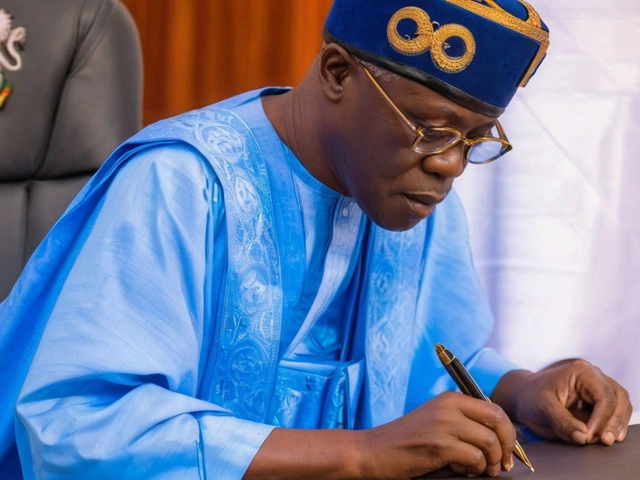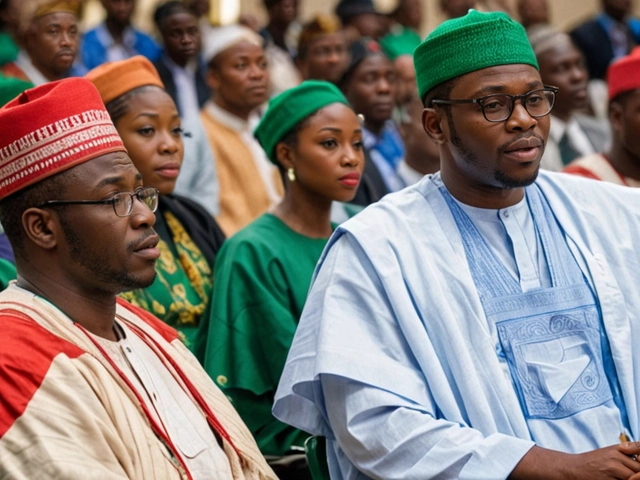President Tinubu Approves New Governing Councils for Tertiary Institutions in Nigeria
In a significant move to strengthen the governance and academic excellence of Nigeria’s federal universities and colleges of education, President Bola Tinubu has approved the appointment of new governing councils. This step is aimed at bolstering the quality of education and fostering a more robust academic environment across the nation’s higher education landscape.
According to the official statement released by the government, the appointments include a diverse group of qualified individuals, each bringing a wealth of experience and dedication to their respective institutions. These new leaders are expected to implement strategic initiatives that will improve educational standards and enhance the overall learning experience for students.
Nigerian Maritime University, Okerenkoko
Among the notable appointments, Temi Harriman has been designated as the Chairman of the Nigerian Maritime University, Okerenkoko, located in Delta State. Harriman’s leadership will be complemented by the expertise of Adeola Adeogun, Benedict Aguele, Freeman Kasa, and Babangida Alhassan Abdullahi, who have been appointed as members. This team is set to navigate the university towards greater achievements and academic distinction.
Nigerian University of Science and Technology, Abuja
Rabe Mudi Bala has been appointed as the Chairman of the Nigerian University of Science and Technology, Abuja. Accompanying him on the council are Mr. Akinola Fagbemi, Rakiatou Bagnou, Alwel Egwurugu, and Femi Osabinu. Together, they are tasked with elevating the university’s status within the scientific community and ensuring it becomes a beacon of innovation and research excellence.
Federal University of Agriculture, Bassam-Biri, Bayelsa
Bram Baifa takes the helm as Chairman of the Federal University of Agriculture, Bassam-Biri, in Bayelsa State. He will be working alongside Richard Odigbo, Yomi Johnson, Fatima Owuna, and Christy Akpehuan Omoruyi. Their collective goal is to enhance agricultural education and research, fostering advancements that will benefit the agricultural sector and the country at large.
Federal University of Health Sciences, Kwale
Ahmadu Barau Banye Salisu has been named the Chairman of the Federal University of Health Sciences, Kwale, Delta State. He is joined by Aragbaye Oluwatosin Gbolagunte, Talba Bauchi, Akaninodo Kehinde Adekunle, and Chibuike Ikenga. Their mission is to drive the institution towards becoming a center of excellence in medical education and health sciences, addressing healthcare challenges within and beyond Nigeria.
Federal University of Medical Sciences, Katsina
Habib Mohammed Ibrahim will lead the Federal University of Medical Sciences, Katsina State as Chairman. The council members include Yau Aisha Abdulkadir, Shehu Kaka, Ibrahim Umar Abbah, and Isijola Rasaki. They are charged with developing medical education standards that will produce competent healthcare professionals to meet the demands of the nation’s healthcare system.
Other Key Appointments
Several other key appointments have also been made to various federal institutions:
- Federal University of Agriculture, Mubi, Adamawa State: Rukayyatu Abdulkareem Gurin as Chairman, with Peter Tanko Dogara, Amina Ibrahim Ndala, Owolabi Shamsideen Oseni, and Olufemi Lawson as members.
- Admiralty University, Ibusa, Delta State: Yusuf Mohammed as Chairman, with Sani Ndanusa, Abdul Oroh, Mary Okaba Agbo, and Omasan Agbajoh as members.
- Nigerian French Language Village, Badagry, Lagos: Labiru Musa Kafur as Chairman, with Ibitoye Victor Philips, Bamgbose S., Musa Ayas, and Ogenyi Okpokwu Emmanuel as members.
- National Institute of Nigerian Languages, Aba, Abia State: Victor O. Ukaogo as Chairman, with Anjare Samuel, David Turuka Ismaila, Adimchinaka Onwukwe, and Princess Ify Ugo Okoye as members.
- Nigerian Army University, Biu, Borno State: Awal Bawa Morike as Chairman, with Mohammed Bashir Umar, Monday Nanza, Mohammed Alhaji Audu, and Sheriff Abdullahi as members.
- Federal University of Medicine and Medical Sciences, Abeokuta, Ogun State: Usman Mohammed Shanawa as Chairman, with Kabiru Yahaya, Chinenye Love Moses, Uyiosasere Ekhosuehi, and Joshua Oludare Adewale as members.
- Nigeria Arabic Language Village, Gamboru Ngala, Borno State: Ahmed Wambai as Chairman, with Gazali Hamza Suleiman, Imam Alfa Rahaman, Isah Kwayami, and Mohammed Ize Mamman as members.
- National Mathematical Centre, Sheda, Kwali, FCT: Edna Njoku as Chairman, with Kovie Andrew Epetutu, Oyinkasola Okewoye, Ibrahim Musa, and Sarah Tukura as members.
President Tinubu has expressed confidence in the newly appointed council members, urging them to bring their extensive experience and dedication to bear in their new roles. He emphasized the importance of their tasks, stressing that their efforts would be critical to lifting the standard of tertiary education in Nigeria.
In his statement, President Tinubu highlighted that the future of Nigeria hinges on the quality of education provided to its citizens. He underscored the need for a top-tier education system to cultivate the minds of the next generation, preparing them to tackle the complex challenges of the modern world. By appointing these individuals to the governing councils, the President aims to create a more cohesive and effective governance structure within these institutions.
As the newly appointed leaders assume their positions, they are expected to prioritize key areas such as academic quality, infrastructure development, faculty recruitment, student welfare, and research innovation. These elements are deemed crucial for the sustainability and growth of Nigeria's educational sector. The councils are also expected to engage with various stakeholders, including government agencies, private sector partners, and international bodies, to secure funding and support for their respective institutions.
Moreover, the appointees are encouraged to foster an environment of accountability and transparency within the universities and colleges. Implementing best practices in governance and management will help in achieving the high standards that President Tinubu envisions. By focusing on performance metrics and continuous improvement, these institutions can achieve better educational outcomes and contribute significantly to national development.
As the educational landscape in Nigeria undergoes transformation under these new appointments, there is a sense of optimism among students, faculty, and educational stakeholders. Many believe that this new wave of leadership will bring about the necessary changes to elevate the standard of education in the country.
The success of this initiative will largely depend on the cooperation and commitment of all involved parties. With a shared vision and a collective effort, Nigeria can look forward to a bright future for its tertiary education system, ultimately leading to a more educated and empowered populace capable of driving the nation's progress.





Comments
President Tinubu's latest move is a testament to Nigeria's rightful place at the forefront of African academia. The selection of seasoned professionals signals a commitment to intellectual excellence that many of us have long advocated for. While some may scoff at the political undertones, it's hard to deny the strategic foresight embedded in these appointments. This is precisely the kind of decisive leadership our nation needs to outshine regional competitors. Let's hope the councils translate this vision into tangible outcomes for our youth.
From a cultural standpoint, strengthening university governance has ripple effects far beyond the campus walls. When institutions uphold rigorous standards, they nurture thinkers who can preserve and evolve our rich heritage. The new councils could foster collaborations with traditional art centers and promote interdisciplinary curricula. It's encouraging to see a policy that intertwines educational quality with cultural vitality. I anticipate vibrant exchanges between academia and our diverse communities.
Awesome news for the education sector lets the students feel hopeful and motivated this new leadership will bring fresh ideas and better resources we all need more support for research and teaching
Don't be fooled by the glossy press release; these appointments are a classic power play. Behind the veneer of academic reform lies a network of patronage that perpetuates elite control. The councils will likely prioritize political loyalty over merit, ensuring the status quo remains untouched. It's another chapter in the long saga of systemic manipulation. Citizens should stay vigilant and demand genuine transparency.
Analyzing the composition of the newly formed governing bodies reveals a strategic alignment of interdisciplinary expertise and sectoral synergies. By integrating stakeholders from maritime, agricultural, and health sciences, the councils are poised to implement a multi-modal governance framework. This approach leverages cross-pollination of best practices, fostering a resilient academic ecosystem. Moreover, the inclusion of members with robust research portfolios enhances the innovation pipeline. Such a configuration should accelerate competency-based outcomes and elevate institutional KPIs.
What a promising development! The fresh perspectives these council members bring can reignite the passion for learning across campuses. With collaborative spirit, we can tackle infrastructural gaps and boost faculty development. I'm optimistic that the students will feel the positive ripple effects soon. Let's keep cheering them on as they navigate this new chapter.
Seeing the government take concrete steps to restructure the governance of our higher education institutions feels like a breath of fresh air after years of stagnation. It is not merely a bureaucratic reshuffle; it is an invitation to reimagine what academic excellence can look like in a country as vibrant and diverse as Nigeria. When I reflect on the historic underinvestment in research infrastructure, I realize that these councils could become the catalysts for a renaissance of scholarly output. Their mandate to improve academic quality, recruit top-tier faculty, and prioritize student welfare aligns with the broader societal need for a knowledge-driven economy. Moreover, the explicit call for stakeholder engagement suggests a move away from insular decision‑making toward a more inclusive, participatory model. Imagine universities collaborating with industry, NGOs, and even international partners to secure funding and share expertise. Such synergies could transform campuses into hubs of innovation, where cutting‑edge research directly addresses local challenges in agriculture, health, and technology. The emphasis on accountability and transparency also resonates deeply; it promises that performance metrics will no longer be vague buzzwords but actionable data points guiding continuous improvement. If these councils truly embody the spirit of reform, we may witness a surge in publications, patents, and graduate employability. That, in turn, could spur economic growth, reduce brain drain, and inspire a new generation of Nigerian scholars. While optimism is warranted, the road ahead will demand unwavering commitment from all parties involved. Resistance from entrenched interests is inevitable, yet the collective vision of a brighter academic future must prevail. In the end, it is the students, the researchers, and the communities they serve who will reap the rewards of this ambitious undertaking. Let us, therefore, support these leaders, monitor their progress, and hold them accountable as they steer our institutions toward excellence.
The announcement reads like a corporate PR memo, devoid of substantive change. Appointing more names to committees doesn't guarantee better outcomes unless there’s a clear, results‑driven agenda. I remain skeptical that these councils will address the systemic underfunding and bureaucratic inertia plaguing our universities. Without transparent benchmarks and external oversight, this could be another hollow gesture. The academic community deserves more than just a rebranded roster.
It's good to see some movement even if the details are thin. We need to keep the pressure on for real accountability. Hope these councils actually push for better labs and resources.
Right on! Every step forward counts. Let’s keep encouraging these changes and celebrate the wins, however small they may be.
Great step forward!
Indeed, this development marks a constructive shift toward strengthening our tertiary education framework. While optimism is warranted, it is essential to complement enthusiasm with rigorous monitoring mechanisms. I recommend establishing clear performance indicators and periodic public reporting to ensure transparency. Such measures will bolster confidence among stakeholders and sustain momentum. Let us collectively uphold these standards as the councils embark on their new responsibilities.